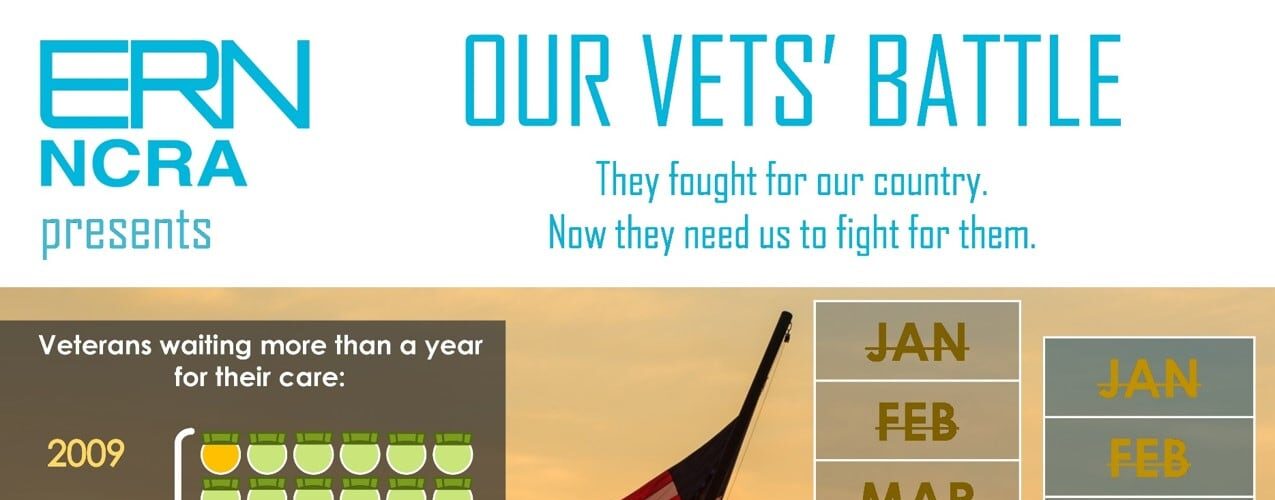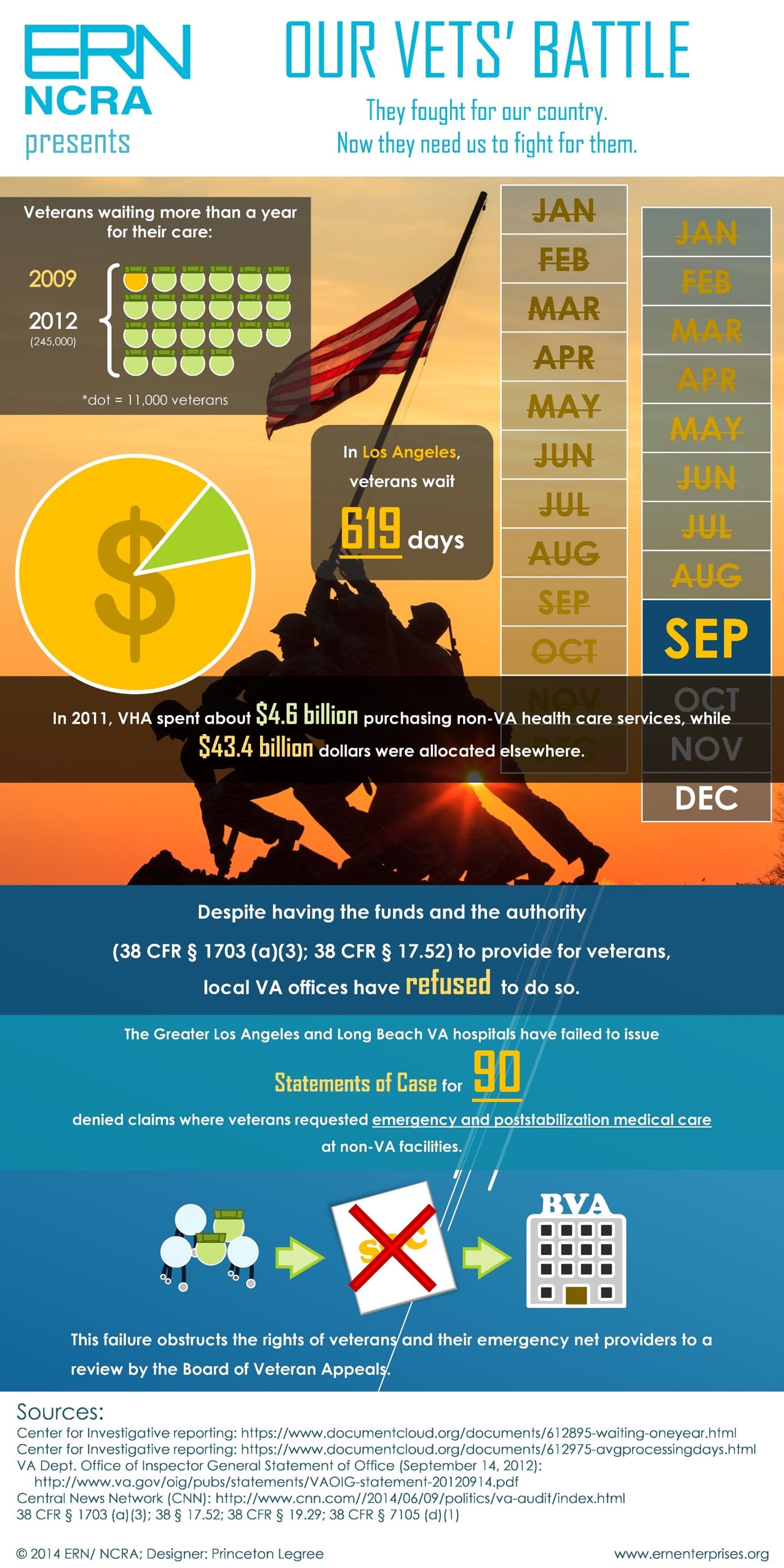
DELAY, DENY, UNTIL I DIE
VA denies representation rights to ninety veterans and their emergency safety net providers. Scroll down to see full infographic.
We’ve not just let them down, we’ve let them die.
– John Boehner, House Speaker
In recent stunning developments, the Veterans Administration is being investigated after allegations of secret waitlists and cover-ups in the VA health care system emerged. Amidst this hospital scandal, the VA Inspector General is expected to determine if treatment delays in VA Hospitals have had fatal repercussions contributing to the death of veterans. The most disturbing report to date originated from the Phoenix VA, where according to sources, at least 40 American veterans died while waiting for care.
In addition to the department’s massive disability-benefits backlog and a disturbing pattern of preventable veteran deaths, an alarming trend of the VA’s inability to honor an emergency provider’s right for reimbursement and our veteran’s right to medical care reminds us that the ongoing battle for veteran lives is not over.
Dr. Katherine Mitchell, a medical director of the Phoenix VA’s post-deployment clinic, has stated the VA’s failures are a result of not having sufficient medical providers equipped to care for our veterans. The slow hiring process, the low pay, and the lack of qualified applicants to select personnel from contribute to the availability of VA resources for veteran care. Thus, there are more patients and not enough VA providers.
Notwithstanding the VA’s rationalization, Federal Law mandates that when VA facilities are not capable of furnishing the care or services required, the VA may contract with non-Department facilities in order to furnish certain care, including hospital care or medical services for the treatment of medical emergencies that pose a serious threat to the life or health of a Veteran receiving medical services in a Department facility until such time following the furnishing of care in the non-Department facility as the Veteran can be safely transferred to a Department facility (38 CFR § 1703 (a)(3); 38 CFR § 17.52)
Title 38 of the United States Code allows the VA to purchase health care services on a fee-for service or contract basis when services are unavailable at VA facilities, when VA medical centers cannot provide services economically due to geographical inaccessibility, or in emergencies when delays may be hazardous to a veteran’s life or health.
On September 14, 2014, the Office of Inspector General from the Department of Veteran Affairs issued a Statement of Office, reporting that in fiscal year 2008, the Veterans Health Administration’s (VHA) medical care budget totaled approximately $39 billion. In fiscal year 2011, the medical care budget increased to about $48 billion. Their findings estimated that of this amount, VHA spent about $4.6 billion to purchase health care services from non-VA entities such as community hospitals, nursing homes, and individual providers. A mind-blowing $43.4 billion dollars were allocated elsewhere.
Our provider members have reported 90 veteran cases where veterans requested emergency medical care at non-VA facilities, reimbursement was denied in whole or in part, and the VA failed to issue a Statement of Case, thus barring the emergency net providers and the veterans the right to a hearing before the Board of Veterans’ Appeals. Shockingly, more veteran cases are being reported.
In most cases:
- A prudent layperson would have believed the symptoms he/she experienced both prior to and during the hospitalization were continually emergent in nature.
- The non-VA facility notified VA at the time the veteran could be safely transferred and the transfer was not accepted.
- A VA facility was not feasibly available during the veteran’s hospitalization, and an attempt to contact the VA beforehand would not have been considered reasonable by a prudent layperson.
Under existing Federal Law, upon the VA’s initial determination:
- A provider or representative must send a written Appeal (or Notice of Disagreement) within one (1) year.
- If the Agency of Jurisdiction (AOJ) cannot clearly identify that communication as expressing an intent to appeal, the AOJ must contact the provider in writing:
- Upon upholding any denial, the AOJ must prepare a Statement of Case (SOC), VA Form 9 and other notices and forward the documentation to the veteran or their representative;
- The Provider can then forward a formal appeal with the BVA by filing VA Form 9 within sixty (60) days from the receipt of the SOC; this timeframe may be extended for good cause.
- AOJ must certify formal appeal for Board review and notify claimant or representative by the completion of VA Form 8, “Certification of Appeal.
In these 90 cases, the respective AOJs received provider appeals, yet failed to issue an SOC. Pursuant to 38 CFR § 19.29 and 38 CFR § 7105 (d)(1), the SOC is a statutory required notice that must be complete enough to allow the appellant to present written and/or oral arguments before the Board of Veterans’ Appeals. It must contain:
- A summary of the evidence in the case relating to the issue or issues with which the appellant or representative has expressed disagreement;
- A summary of the applicable laws and regulations, with appropriate citations, and a discussion of how such laws and regulations affect the determination; and
- The determination of the agency of jurisdiction on each issue and the reasons for each such determination with respect to which disagreement has been expressed.
Without this SOC, providers or their representatives cannot send a formal appeal. The VA’s alarming trend of failing to issue this statutory notice denies the veterans’ right to a hearing with the BVA.
We have requested the VA VISN 22 to reexamine and resolve a process failure involving multiple uncompensated veteran claims by local VA hospitals where non-contracted providers have rendered emergency services in good faith and the VA failed to issue Statements of Case.
It is worth noting that the United States Supreme Court has previously ruled in favor of Veterans in cases where the VA has failed to issue statutory required notices. In Shinseki v. Sanders, 129 S. Ct. 1696 (2009), the Court addressed two civil cases where the VA had denied veterans’ claims for disability benefits. In both cases, the VA erroneously failed to provide the veteran with a certain kind of statutorily required notice. In both cases, the VA argued that the error was harmless. And in both cases, the Court of Appeals for the Federal Circuit, after setting forth a framework for determining whether a notice error is harmless, rejected the VA’s argument.
Despite the existing case law and the growing allegations, the VA has yet to hold itself accountable for failing to ensure that quality care is afforded to our veterans, albeit through a VA facility or a non-VA facility.
Thomas Lynch, assistant deputy undersecretary for health for clinical operations at the VA, was questioned in regards to accountability for the VA’s slow response, limited transparency and failure to respond and rectify the issues. Lynch commented, “I think we need to be careful about punishing everybody for what happened at a few medical centers.”
A VA Memo by William Schoenhard, who was a VA deputy undersecretary, referred to a growing picture of “gaming strategies.” Delayed care, alleged falsification of records, possible medical harm to veterans, refusing to abide by their own policies and procedures, and barring provider and veteran rights to a hearing before the Board of Veteran Appeals, are some of the strategies that remain unresolved and, until now, unchallenged.
On this Memorial Day, we remember the men and women who have died while serving our country. The purpose of this advisory is to honor the memory and the sacrifice of those who have served so that the VA fulfills its obligations under federal law by drawing attention to the VA’s unethical practices.
We need Reform. We need Change.
TOGETHER we will:
- Challenge the VA’s misuse of federal funds intended for the veterans, and denial of Veteran rights and benefits that should be afforded to those that have served our country.
- Challenge the VA’s willingness to grant veterans an effective health system that will promote, preserve, or restore the health of the veteran. (38 CFR § 17.38)
- Challenge the VA’s ability to follow their own established policies and procedures to ensure that all veteran claims are resolved consistent with federal law.
Our goal is to ensure and protect a veteran’s right to access to care. In light of this healthcare crisis, will the VA rectify this monstrous process failure so that emergency net providers can keep their doors open and provide quality care to 1,972,00 million veterans in the state of California?
Join the small handful of people who will advocate for veteran and emergency provider rights.
If you are a non-VA medical provider who has provided care to Veterans of the United States Armed Forces that has been uncompensated, had claims improperly denied, have been negated the right to a statutory mandated Statement of Case and have been barred the right to a BVA hearing, we want to hear from you. Report your unfair payment practice of the VA by clicking on the ‘Report Abuse’ link above.

About The Reimbursement Advocacy Firm
With the health care safety net for millions of Californians imperiled by the economic crisis, ERN/The Reimbursement Advocacy Firm works toward helping providers keep their doors open, ensuring Californians access to critical trauma and medically necessary care.
ERN/The Reimbursement Advocacy Firm works with members to strengthen their voice to redress unfair payment practices with state and federal regulatory agencies. We are an authority in administrative laws that challenge decisions, policies or practices that have a negative impact on quality care.
Because every case represents a human life.
– Ed Norwood, President of ERN/The National Council of Reimbursement Advocacy.
Press Contact:
ERN/ The Reimbursement Advocacy Firm
Magali Godfrey, CCA & Writer
(714)995-6900 ext. 6948
magaligodfrey@ernenterprises.org
Categorised in: Enforcement Campaigns, Press Releases
This post was written by ERN Enterprises, Inc.